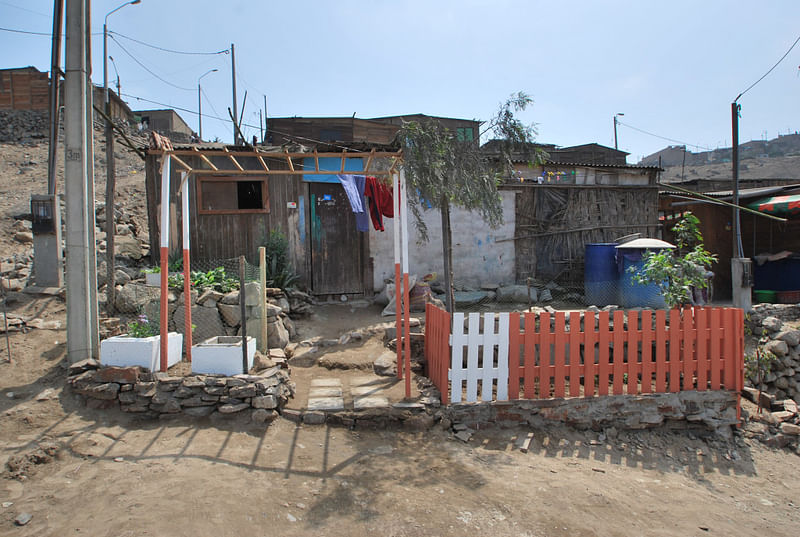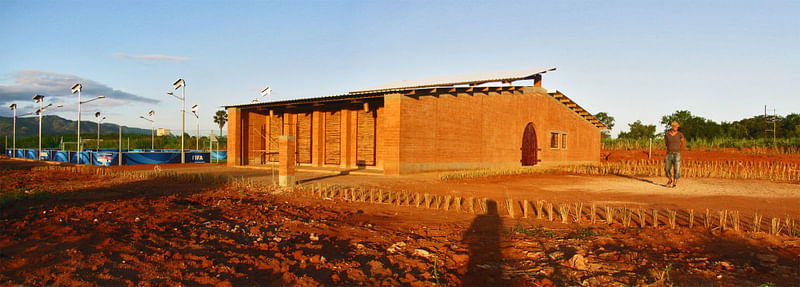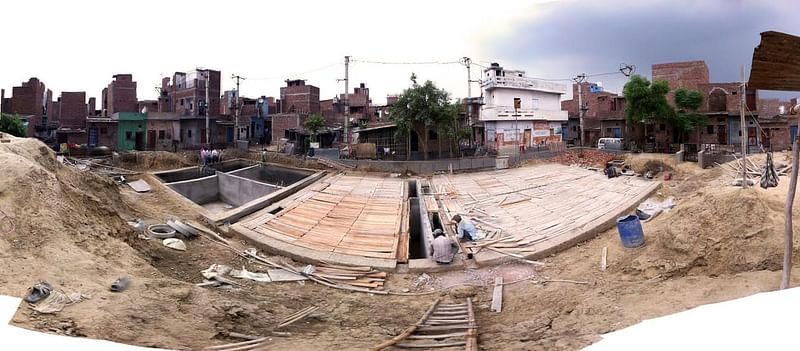SEED Award winners for Excellence in Public Interest Design
By Bustler Editors|
Friday, Jan 31, 2014

Related
The winners were recently announced in the fourth annual SEED Awards for Excellence in Public Interest Design. The SEED Awards acknowledges design projects that highlight pressing social, environmental, and economic issues in the world.
Out of 28 applications, the jury selected six winners -- some previously listed in the Public Interest Design Global:
- Towns Association for Environmental Quality Green Building Headquarters
- Comunidad Ecologica Saludable
- Can City, Sao Paulo
- Manica Football for Hope Centre
- Community How-To-Guides
- The Potty Project
Winning projects received a US$1,000 honorarium and an all-expenses-paid trip for one team representative to present at the Structures for Inclusion conference in New York City on March 22-23, 2014.
Three honorable mentions were also awarded to: Dimen Kam Minority Cultural Heritage in China, Dimen, China; Walk [Your City], Raleigh, NC; and People Organizing Place, Dallas, Texas.
The jury members were: William Morrish, Jury Chair, of Parsons The New School of Design; Cara McCarty of the Cooper-Hewitt National Design Museum; Andres Lepik of the Architekturmuseum der Technischen Universität München; Esther Yang of the Max Bond Center for Design for the Just City; and Christopher London of The New School.
Towns Association for Environmental Quality Green Building Headquarters
Location: Sakhnin, Israel
Issues: Cultural Heritage, Local Identity, Job Training, Environmental Education, Green Energy
Team: Abed Yassem, Lead Architect; Riyad Dwairy, Architect; Hussein Tarabeih, PhD; Mayors of TAEQ’s municipalities: Sakhnin Municipality: Mustafa Abu Raya; Arrabe: Yasin Yasin; Dier Hanna: Samir Hussein; Eilaboun: Hana Sawed; Kaukab: Nawaaf Hjoje; Buine Najidat: Monir Hamudi; Dr. Shlomo Kimchie; Saleh Waked; Hanadi Higress; Said Khalaily; Bassem Ghanaim, Ali Osman
Summary: The Towns Association for Environmental Quality (TAEQ) Green Building, located in Sakhnin, is home to the first environmental organization to arise out of Israel’s minority Arab sector, which comprises 20% of the total population of the country. TAEQ is a municipal collaborative that organizes funds and resources from the six participating Arab municipalities for social, environmental, and economic development. Located in Israel’s northern Galilee region, TAEQ serves the populations of these towns, about 80,000 residents.
Acting as a cultural meeting ground, the green building hosts 60,000 visitors to its campus annually, including women, farmers, the elderly, school groups, teachers, university students, scientific researchers, city planners, employees of local municipalities and visitors from abroad. Visitors participate in workshops and training courses related to ecology and sustainable development.

Comunidad Ecologica Saludable
Location: Puenta Piedra, Lima, Peru
Issues: Empowerment, Green Gardening, Health and Wellbeing, Food and Water Security, Access to Nature
Team: Residents of the Eliseo Collazos neighborhood in Lomas de Zapallal, Lima Peru Maximira (Marcia) Rodriguez, community leader of Eliseo Collazos; University of Washington Assistant Professor Ben Spencer, Dr. Susan Bolton; Dr. Joachim Voss, RN, ACRN; Jorge (Coco) Alarcon; Brooke Alford Leann Andrews; Shara Feld; Gayna Nakajo; Rekha Ravindran; Francisca Salazar; University of Washington students in the Design Activism Studio and Seminars
Summary: Over 3 million people in Lima live in informal urban neighborhoods. Lomas de Zapallal is one such settlement in Northern Lima. It has a population of 27,000 and is divided into 19 neighborhoods. The Comunidad Ecologica Saludable (Healthy Ecological Community) program is providing residents of Eliseo Collazos with a thoroughly researched system to address multiple challenges of Empowerment, Green Gardening, Health and Wellbeing, Food and Water Security, Access to Nature. The project uses fog provides as a new water resource for drinking, household use and the irrigation of home gardens, community parks and reforestation. In the first phase, twenty-nine families will use this new source of water to create gardens for food as well as space to relax and socialize.

Can City
Location: Sao Paulo, Brazil
Issues: Local Identity, Employment, Environmental Sustainability
Team: Alexander Groves, Designer; Azusa Murakami, Designer; Anya Teixeira, Production Assistant; Olivia Faria, PR and Community Organizer; Agatha Faria, Finance; Leonardo Giardini from Preserva Recicla, Collectors of Recyclables; Fabio Esteves; Edson and team from Foundry Metais; Juriaan Booij, Film Maker; Isso Ex, Catadore; Jejo Cornelsen, Artist; Paola Croso, Translator; Renata Padovan, Translator and Artist, Carlos Mancebo; Elcides, Catadore; Que Que, Catadore; Wilson, Catadore; Ricardo, Catadore; Alan, Catadore; Omar and Margareth Faria,; Richard Kovacs, assistant; Team from Heineken Brasil, Sponser; Team from Coletivo Amor de Madre, Project Production; Pedro Faria, Assistant; Fabio de Paula, Researcher
Summary: Over 80% of recycling in Brazil is done by independent waste collectors called Catadores – the many waste collectors who pull carts by hand collecting waste materials to sell at scrap yards. Can City is a mobile aluminum foundry that melts cans collected on the streets of Sao Paulo to cast new products. The project has been initiated in the largest city in Brazil as a self-sustaining system that creates better employment and additional income for Catadores. The small foundry is fueled by used-cooking oil and the value-added products created can be sold on the streets and provide additional income for this low-income group.

Manica Football for Hope Centre
Location: Bairro Vumba (Vumba neighborhood), Manica, Mozambique
Issues: Empowerment, Recreation/Play, Strengthening Community, Environmental Sustainability
Team: Architecture for Humanity: Paulo Fernandes, Alina Jeronimo, Kevin Gannon, Mark Warren, Alix Ogilvie, Gretchen Mokry and Delphine Luboz; Jose Forjaz, Jose Forjaz Architects; Betar Estudos e Projectos: Sergio Martires, Engineer; GTO Engenheiros Consultores: Fernando Pimentel, Engineer; Martins Mariano, Engineer; Grupo Deportivo Manica: Shot Chikwandingwa; FIFA: Cornelia Genoni; Streefootballworld, and Ian Mills, 20 Centres for 2010; Greenfields: Franclin Ngwese; Yingli Solar: Ana Pardal, Yingli Green Energy Europe GmbH
Summary: Manica Football for Hope Centre is part of the ”20 Centres for 2010” is the Official Campaign of the 2010 FIFA World Cup South Africa. The objective of the Football for Hope Movement is to establish a quality seal for sustainable social and human development programs working with football as the central tool in the areas of Health Promotion, Peace Building, Anti-Discrimination & Social Integration, Children’s Rights & Education and the Environment. Manica Football for Hope Centre involved the community in the design process and provided forty-nine jobs during construction. The design reflects the vernacular roots of the area and allows for all-weather use, natural air ventilation and is built with readily available. The center provides a football pitch, multi-purpose space, computer room, and classroom for health, wellness, and learning programs.

Community How-To-Guides
Location: Detroit, MI, USA
Issues: Civic Engagement, Empowerment, Access to Services, Learning, Business Training
Team: Impact Detroit and Detroit Collaborative Design: Ceara O’Leary, Virginia Stanard, Krista Wilson, Monica Chadha; Gaston Nash, College Core Block Club; Sam Butler, Community Development Advocates of Detroit; Michael Forsyth, Detroit Economic Growth Corporation; Sandra Yu, Detroiters Working for Environmental Justice; Lori Allen, Revolve Detroit; Rebecca Willis, Bleeding Heart Design
Summary: Impact Detroit has developed a series of Community How-to Guides for communities and organizations that highlight lessons learned and share helpful information for new projects and processes. These informational guides seek to build the capacity of local organizations providing access to information that can often be difficult to find. The guides explain city processes that allow for communities to take action, be empowered, and build broader community support.

The Potty Project
Location: New Delhi, India
Issues: Women/Gender Safety, Sanitation, Affordable Housing, Access to Services, Affordable Housing
Team: Julia King (Lead Architect), Dr. Renu Khosla (Team Leader), Sidharth Shanker Pandey (Programme Coordinator), Mr Zaidi Kumar (Chief Engineer), Maurice Mitchell (Academic Advisor) and the residents of Savda Ghevra ‘A’ Block resettlement colony
Summary: In many informal settlements, a lack of sanitation is one of the major health problems. By applying an additive strategy, this project in a resettlement area of Savda Gherva significantly improves hygiene and strengthens social cohesion within the local community by involving the residents throughout the process. A pilot project commenced in 2012 to provide off-grid sanitation to more than 1,500 people. The issues addressed by the project also include safety for women, a problem increased by the current conditions.
Image via 2014 SEED Awards for Excellence in Public Interest Design.

Share
0 Comments
Comment as :